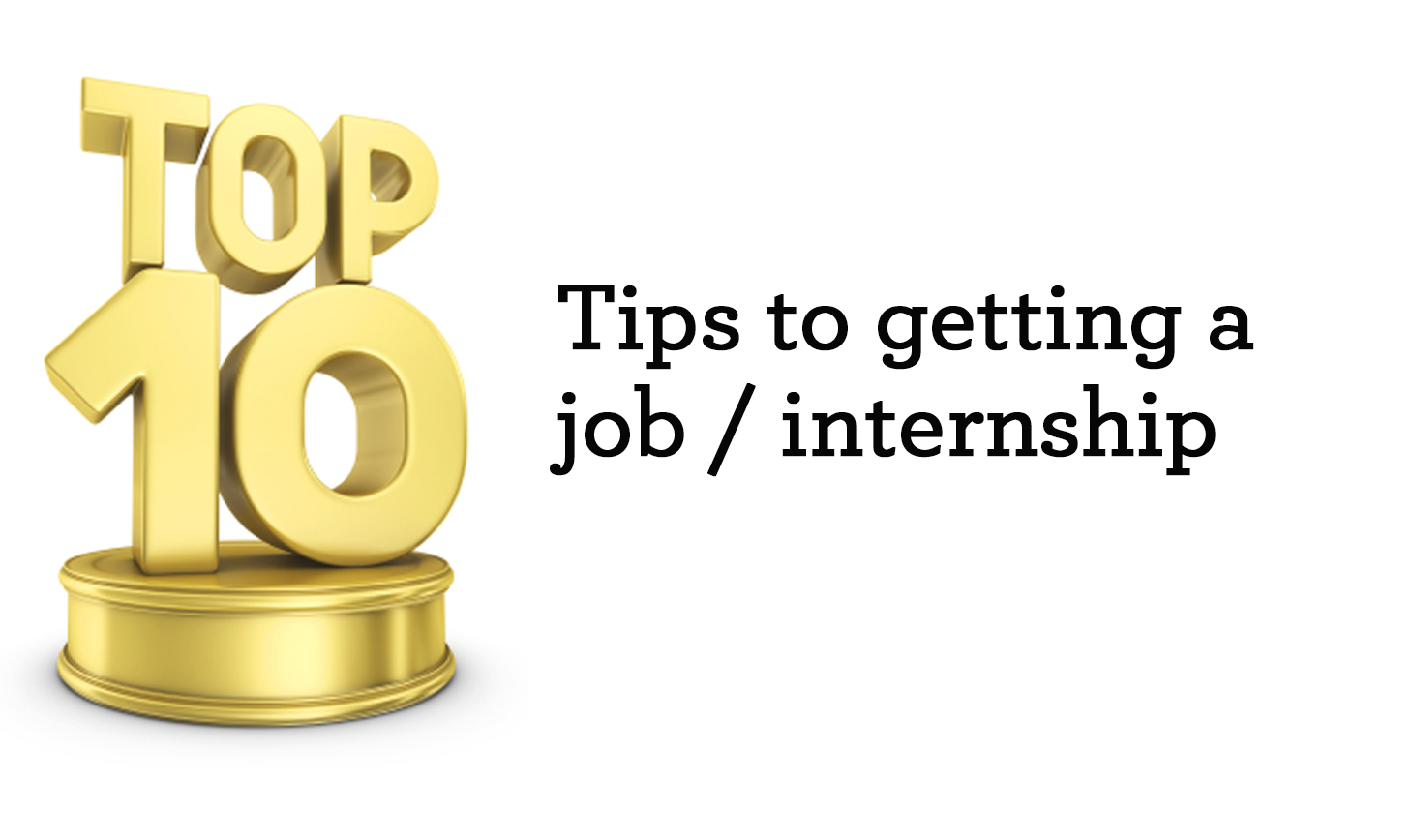
Top Ten tips to getting your first job/internship
The summer is almost here and many of you will be on the hunt for summer placements, or starting to look for your first jobs. There is, of course, a need to have time to kick back and enjoy the summer too, but don’t put this off or the best opportunities will be gone.
Firstly, why do an internship or work experience? For three main reasons:
- You will be building your CV with experience more valuable than solely retail and babysitting jobs.
- You will be meeting people in the industry you’ve set your sights on, and those will become part of the network that you’ll need later on. – when hundreds of other people are applying for the same jobs, knowing someone who works at the firm already can be a great door opener – although you’ll need your own skills and nuance to get the job!
- It is a great way to try something out and make sure that what you think you want is right for you. You might wind up hating it. Or you might discover that there’s a specific path within that industry that you want to pursue.
Here are our top tips to get your first step on the ladder and to start building the skills and experience you need for your future career.
1. Personalise your cover letter
It can be tempting to write a boilerplate cover letter and use it for every application. While this may save time in the short term, it may not do you any favours. Companies want to know why you want to work with them, so do your research before you write. Make your cover letter as specific as you can. Tell the hiring manager why you are a perfect fit for the position and the company, what you hope to learn from the specific position, and how your skills make you a unique candidate – even if you don’t have a ton of experience. Focus on why you are a fit for the position and not just why you love the company. Tell them what you bring to the table.
2. Start early (but it’s never too late)
Some industries recruit for internships and graduate programmes almost a full year in advance, but don’t give up hope if you are just getting to this now. Smaller companies without rigid internship programmes are more flexible, so don’t panic if you get a late start. Check out a couple of the opportunities members of the Reigatian network have told us about that probably aren’t on any job sites here
3. Use resources available to you
If you are at Uni, you probably already know that your career office is a great first stop – there may be some companies recruiting directly through their office because the hiring manager (or more senior) is an alumnus, and again, don’t forget about the Reigatian network. Careers offices can also advise and edit your CV and help you prepare for interview.
4. Search jobs boards
There are the big job-search sites, like Indeed and LinkedIn, and there are other industry or role specific sites too. If you are looking for an internship or role in a certain industry, it is good to look at more specialised jobs boards. For example, charityjob for nonprofits, TES for teaching.
5. Learn to network
LinkedIn is one of the most important tools that anyone starting to look for a job can possibly leverage. Start by searching on a company you would love to work at and join the RGS Professionals Group to find those who went to RGS who either work there now or used to. Connect to them and add a note to your connection request for a short 30-minute conversation. You can ask them what they do and what they like about the company. After you have the conversation online or in person, you can ask if they know of any opportunities or if they wouldn’t mind being mentioned if you end up applying for something there.
6. Consider smaller companies
As you’re searching on, you can also see where people who work at your dream company end up working next, and where perhaps they started out. Some cut their teeth or end up in smaller or less well-known firms that could have opportunities for you. So don’t just think about the big, famous brands, they don’t necessarily make for the best experiences of actually learning real things that will help you down the road.
7. Look for paid internships first
Offering unpaid positions used to be a standard for highly competitive industries, but luckily, laws and progressive thinking have caught up. A bonus is that because they’re paying, they make sure to give them work to do, too.
8. Get a grant for an unpaid internship
Unfortunately, there are still some places (particularly charities/non profits) that only offer unpaid positions. You could get a second job to help support you, or you could apply for a grant to help cover your expenses. Some universities offer these grants, as do some industries.
9. Keep tweaking your CV
Don’t think you can just download a CV template from the internet and send it off everywhere without another thought. Keep tailoring your materials to the roles you actually want. Make the most of the experience that you have and big up the things that are relevant for the role you want (but keep it real!).
10. Check out some more opportunities:
- Want to read more… here are some opportunities available through the network you could apply for
- The Independent has a good article on the 6 sites you need to know for internship opportunities
